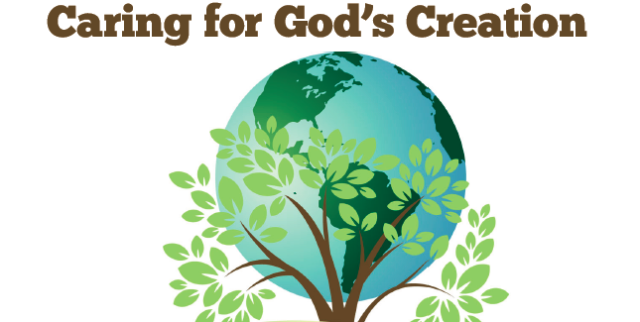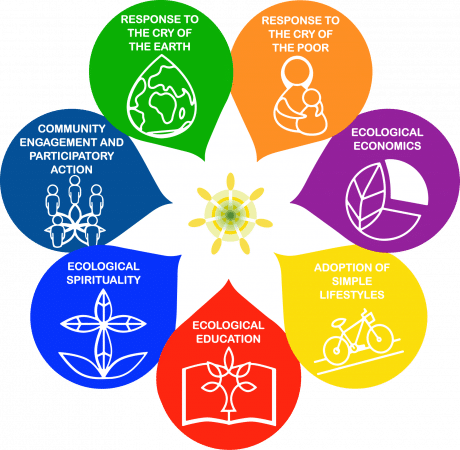Care for creation - all talk and no action?
This is the one that begins “Eternal Spirit, Earth-maker, Pain-bearer, Life-giver”; when it comes to the bread petition it reads “with the bread we need for today, feed us”. This acknowledges that God is the one who provides, and it is the bread we NEED not the bread we WANT, and it is sufficient for TODAY, not a huge surplus. Just as in the wilderness with the manna, God provided the daily needs for the people every day and they were to collect just enough for their needs for that day and no more and there was enough for everyone. Hold on to that thought.
We live in a world which believes in a growth economy, the repeated mantra year after year is we must grow the economy. We all acknowledge the widening gap between rich and poor, not just in our country but globally and the solution we are told is to grow the economy that too will help the poor, we are reassured. What is the definition of insanity? - to repeat the same thing and expect different results - and yet we continue to do the same thing, focus on growth and expect a different outcome.
In 1984 the Anglican consultative council developed and adopted four marks of mission. They acknowledged that the mission of the Church is the mission of Christ
Here are the first four marks
1) to proclaim the Good News of the Kingdom
2) to teach, baptise and nurture new believers
3) to respond to human need by loving service
4) to transform unjust structures of society, to challenge violence of every kind and pursue peace and reconciliation
In 1990, 33 years ago, the council said “We now feel that our understanding of the ecological crisis, and indeed of the threats to the unity of all creation, mean that we have to add a fifth affirmation.”
The 5th mark of mission is to “strive to safeguard the integrity of creation, and sustain and renew the life of the earth.”
In business today, everyone has a mission statement - this was ours. This is not an overseas mission statement - this is the mission statement with which every activity we do should align.
We think of these as marks of mission for the church but the church is made up of us, individuals. Should these marks of mission not just be marks to measure our organisation against but perhaps, marks to measure our own lives against? It’s creationtide season - how are we doing with that fifth mark of mission as a church and in our individual lives. We committed to that 33 years ago.
In the parable of the two sons, Jesus compared two responses to a father’s request in this case it was a request to work in the vineyard (yet another vineyard parable!). The first son said no - he looks like a disobedient child, defying his parent. The second son was the obedient one - “yes Dad, sure” he said. But he just didn’t get around to doing it - we are not told why, was he just incorrigibly lazy? maybe. Did he just get distracted by other things to do? Perhaps he thought - “if my brothers not doing it why should I”? We are not told about his motivations we just hear about his action or lack of it. Son number one, who sounds like the nightmare teenager that some of us may have come across at times, was different. He repented. The phrase is “he changed his mind and went,” but that’s what repentance is. It’s changing your mind and doing something different. Every week in our service there is a time for confession and repentance - but if we just repeat the “I’m sorry” words and don’t change how we live and what we do - its not real Biblical repentance - its just a verbal apology.
In the Ezekiel reading, the prophet speaks of sin and death - this is uncomfortable reading for us - we have tended to read it in the past as the punishment of a vengeful god and this is hard to mesh with a god of love. But if we see the death as the outcome of the sinful actions perhaps this makes more sense. If we look at the way we have sinned against creation the outcome is death, for humans, animals and entire environments. For a recent ethics essay I looked at intensive dairying. I read the work of Dr Mike Joy a freshwater ecologist. He states that 85% of waterways in pasture catchments (which make up about 1/2 our countries waterways) exceed the nitrate-nitrogen guideline values for health ecosystems. This is thought to be contributing to NZ’s high rate of bowel cancer and is certainly causing the death of fish downstream and other organisms. The result of our sin and greed and thoughtlessness as we abuse and exploit our environment is indeed death for us, for other creatures and the actual environment.
This is a call for action, a call for change. Sometimes we can respond like the first son, we don’t want to know and we don’t want to change. It doesn’t apply to me, I’m not going to change… Sometimes we respond like Son No 2 - this is terrible of course I’ll change - but if we look at the dreadful situation of our waterways here in NZ it seems that such responses have been all talk and no action. Perhaps like son No. 1 we can reconsider our initial response and begin the painful process of change, of repentance, of action. Because if there’s one thing that parable teaches us it’s the old adage “actions speak louder than words”.
This parable Jesus taught was in response to yet another clash with the chief priests and elders, there in the temple - the house of God. They sought to trap Jesus by challenging his authority. . Jesus saw through them exposed their lack of godly faith in his parable in the comment after it where he said “even after you saw it, you did not change your minds and believe him.”
We have been doing the same thing over and over, focussing on economic growth since the great depression, getting close to 100 years. Although the evidence is that it doesn’t help poverty, it causes environmental abuse, and it is leading to the current climate crisis we have not considered change. There are annual United Nations conferences on climate change and how to respond to it, there is a lot of talk but very little actual action, because we bow to the god of economic growth before we acknowledge the loving creator of our world. Perhaps instead of a “growth economy” we need to live in a world where “everyone has the bread they need for today”. A more “circular economy” which values sharing and equity.
It’s easy to talk about “them” not changing - the UN, other countries, “the government”, the multinational corporations - the nebulous “them”. But how do we respond as a church and as the individual members of the church. Are we like “them” all talk and no action in our so-called commitment to the fifth mark of mission to “strive to safeguard the integrity of creation, and sustain and renew the life of the earth”. Am I doing everything I possibly could? is there anything I could change in my life, however inconvenient, which might indicate that I am serious about caring for God’s good and beautiful creation? Earlier I spoke of the environmental impact of intensive dairying but that is only one example of something which is part of most of our lives and causes environmental damage. In 2006 the UN Food and Agriculture Organisation published “Livestock’s long shadow” exposing the impact of animal agriculture on environmental problems and its contribution to the climate crisis. We’ve had 17 years to respond to this, the response that is called for is both individual and systemic. We talk of the impact of transport on the environment and at the same time demand more roads (which enables more cars) and we balk at paying out for a better rail system, a better public transport system. We want to have our cake and eat it too, we want “them” to make changes but we don’t want it to impact our pockets and we don’t want to change how we live.
Our example is Christ Jesus “who, though he was in the form of God, did not regard equality with God as something to be exploited, but emptied himself, taking the form of a slave, being born in human likeness. And being found in human form, he humbled himself and became obedient to the point of death…” as we read in today’s epistle. Our example is one of loving sacrifice.
Today is the last Sunday in the creationtide season, our worship has focussed on God’s creation. At the end of the service we are sent out with the words “Go now to love and serve the Lord. Go in peace.” And we respond: Amen. We go in the name of Christ. We are committing ourselves to the mission of Christ. May it be echoed in how we live throughout this and every week as we care for God’s good creation.



Comments
Post a Comment